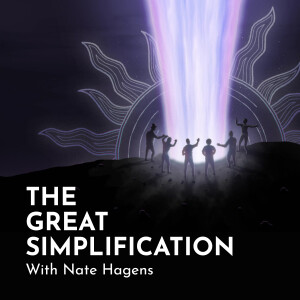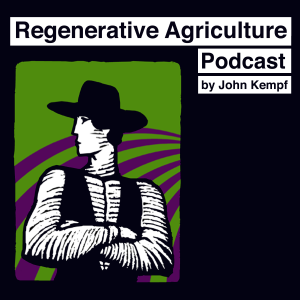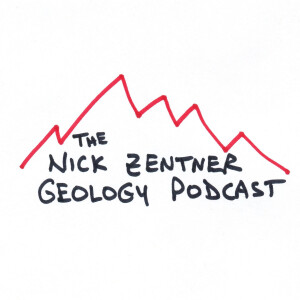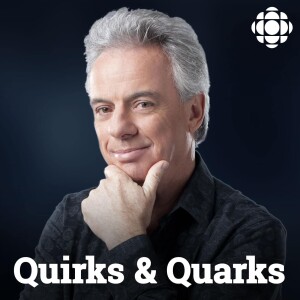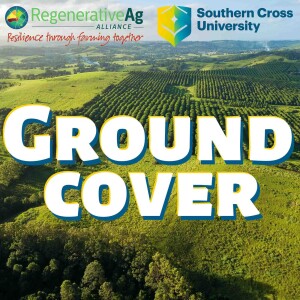

Episode List

An introduction to Ground Cover - a series exploring the trials and tribulation of the regenerative agriculture revolution
Welcome to the introductory episode of Ground Cover – a podcast for farmers by farmers.This podcast is brought you by the Regenerative Agriculture Alliance, in partnership with Southern Cross University.Ground Cover is a uniquely Australian series exploring real-life stories of land managers who have undertaken the transition from conventional farming to regenerative agriculture.Each week the Regenerative Agriculture Alliance will bring you a unique and honest conversation about the challenges and opportunities of regenerative agriculture so you can make informed decisions about how best to manage your land.The Regenerative Agriculture Alliance was founded to address the urgent need to transition from conventional farming to regenerative farming practices.As the Regenerative Agriculture Alliance’s director Lorraine Gordon often says: “The Sustainability ship has sailed”. We need to start fixing what is fundamentally broken and start regenerating landscapes.Enter the regenerative agriculture movement.Regenerative Agriculture is a system of farming principles and practices that increases biodiversity, enriches soils, improves watersheds, and enhances ecosystem services.It is a practice which aims to capture carbon in soil, reversing current global trends of atmospheric accumulation.At the same time, it offers increased yields, resilience to climate instability, and higher health and vitality for farming and livestock communities.Regenerative agriculture draws from decades of scientific and applied research by the global communities of organic farming, agroecology, Holistic Management, and agroforestry – many of these experts can be found at Southern Cross University, world-renowned for its plant and soil labs and environmental science research.Southern Cross University has a track record in driving collaboration on an unprecedented scale. The regional University has the proven capability to deliver national and global results across all primary industry sectors.Each episode of Ground Cover will be introduced by Lorraine Gordon, director of strategic projects at Southern Cross University and founder of the Regenerative Agricultural Alliance.Named Rural Community Leader in the 2018 Farmer of the Year awards and a former NSW ABC Rural Woman of the Year, Lorraine, an Ebor grazier, is the driving force for the alliance.Lorraine is also the director of the Farming Together Program, which delivered a multi-award winning knowledge mobilisation model to 28,500 primary producers nationwide, unlocking the power of collaboration and empowering a generation of primary producers.Lorraine’s story and her mission to transition Australia for a resilient farming future, will feature in our eighth and final episode of this season along with a very exciting announcement which is set to be a game-changer for agricultural education in this country, so be sure to subscribe to Ground Cover and catch the big reveal at the end.In the meantime Ground Cover will feature seven of the leading practitioners in the regenerative agriculture space and is hosted by the veteran voice of Australian ag, Kerry Cochrane.Kerry is a leader in ag education as well as a seasoned rural reporter. As President of the Australian Institute of Ecological Agriculture Cooperative, his passion is one of promoting an ecological approach to life as a key strategy in mitigating against climate change.It is fitting that we launch the series with none other than Dr Charles Massy, self-described ‘underground revolutionary’, farmer, and author of the Best Selling book ‘Call of The Reed Warbler.He shares his personal experience – as an unknowing, chemical-using farmer with dead soils to a radical ecologist farmer carefully regenerating a 2000-hectare property to a state of natural health.Charles is a storyteller who connect the dots between healing the soil, healing the planet, and repairing what it is to be fundamentally human.In this Australia-first podcast you will hear from the leaders and revolutionaries in this space. You will hear them speak about the technical changes in their soil but you will also hear them speak about deeper unexpected changes … in their values, in their connection to land and their connection to community – such is the all-encompassing nature of regenerative farming.Welcome to Ground Cover. We hope you enjoy.

The regenerative agriculture revolution with Dr Charles Massy
Today, on Ground Cover, Kerry Cochrane speaks to renown author and regenerative farming revolutionary, Dr Charles Massy; a well known grazier from Cooma in the southern Snowies of NSW. A man, who through a paradigm shift in a very tough drought, realised his ignorance as a conventional and industrial farmer, to go on and become a famous author and academic.In this episode Charlie talks about:the time for change being ripe and farmers being intimate with their own landscape and environmentchallenging powerful paradigms and how we have de-stabilised the planet, due to: capitalism, economic rationalism, endless growth and, of course, industrialisationthe anthropocene: the greatest challenge our species has ever confronted and regenerative practices as the solutionthe importance of regenerative agriculture in capturing carbonthe five basic functions of healthy landscapes: solar energy, water, soil, mineral cycles and biodiversity, and humansthe importance of ecological literacy within the education systemCharlie goes on to refer to regenerative agriculture as a revolution. One that can only happen from the bottom up.A little more about Dr Charles Massy:Dr Massy gained a Bachelor of Science (Zoology, Human Ecology) at ANU (1976), before going farming for 35 years, developing the prominent Merino sheep stud 'Severn Park'. Concern at ongoing land degradation and humanity's sustainability challenge led him to return to ANU in 2009 to undertake a PhD in Human Ecology. He was awarded an Order of Australia Medal for his service as Chair and Director of a number of research organisations and statutory wool boards. He has also served on national and international review panels in sheep and wool research and development and genomics.Charles has authored serval books, including Breaking the Sheeps Back and the best selling Call of the Reed Warbler.Charles has managed an almost 2000ha sheep and cattle property; running an average of 8000 - 10000 stock units, for over 40 years. In addition he has managed other properties totally 7000ha for city business interests. In the course of this he has led various local rural organisations plus was a regional bushfire captain.Charles has conducted public speaking, lecturing and education over many years, initially in the fields of transformation and innovation in the Merino sheep and wool industries, and more recently in regenerative landscape management, grazing systems for healthy landscape function and addressing climate change and the current global ecological challenges for our species - including for such organisations as Greening Australia, Regional Landcare groups, and the Federal Governments Carbon Farming Initiative; plus lecture to Human Ecology students at ANU.

From bare paddock to diverse landscape with Bruce Maynard: No Kill Cropping, Self Herding and grazing management
Today, Kerry Cochrane talks with Bruce Maynard, a mixed farmer from Narromine, NSW, who was a conventional farmer, direct drilling for a decade or so, before making the switch to regenerative practices. From bare paddocks to diversity, from nature to nurture, this is a conversation exploring the journey that has seen Bruce affectionately known as 'the King of no kill cropping'. This the story of a man who was not happy with the notion of taking everything, other than what you were trying to grow, to ground zero. He wasn't happy with the monocultural approach and the simplification of the system. So he went out in search of another way. In this episode we explore:examine the need for diversity in order to flourish, including economicallyhow Bruce changed his grazing managementtheir move to no till cropping to encourage diversity in the landscapethe 5 principles of no till croppingthe use of medicinal shrubs to help supplement animal dietsmineral licksself herding and livestock adaptation and choicestress free stock handling grass free grainsA broad thinker, a perfectionist in seeking the truth, and a true practicing scientist is today's guest, Bruce Maynard.More about Bruce Maynard:Bruce is a farmer and grazier from the Central West of NSW. He has been at the forefront of a number of innovations in Australian agriculture including: grazing management, stress free Stockmanship, self herding and the use of forage shrubs in grazing landscapes. He developed the No Kill Cropping method. As well as running the farm with his family. Bruce currently conducts extension projects around Australia on No Kill Cropping, Self Herding and grazing management.Bruce Maynard, The Lazy Farmer, is the inventor of the Regenerative Agricultural practice of No Kill Cropping.His farming operations reflect a desire to demonstrate true Triple Bottom Line principles, where a balance between profit, soil and landscape function. biodiversity and a healthy social life is continually striven for.What he has achieved with limited resources is truly remarkable and an example for other land managers to draw from in these changing times.

It all starts with the soil with Derek Smith
Today, Kerry chats with Derek Smith, a mixed farmer from Guyra who has come along the journey from conventional to regenerative farmer.Derek started his days at the Orange Ag college and over the years experienced a number of problems on his property from crop health issues, animal health issues, weeds, fungal diseases, and insects and pests. Derek was always on the look out for a silver bullet that just wasn't there. So, Derek found himself asking some pretty critical questions of himself and his practices. He found he was quickly questioning and challenging the status quo.In this episode we explore:the importance of soil health... everything starts with the soilthe William Albrecht methodologysoil microbiologylinks between soil health, plant health and human healththe cation exchange capacityMore on Derek Smith:A lifelong farmer, Derek has embraced natural farming as a way to protect biodiversity, store carbon and maintain consistent food production. He is currently running beef cattle, free range layer hens plus prime lambs on his property Kenilworth.For 20 years Derek shared his experience as an instructor at TAFE Armidale. As the teacher of a year long course in organic farming and in the past, horticulture, he helps students apply organic or biologically enhancing principles to their own farms. Over the years Derek has built on his Associate Diploma in Farm Management at the Orange Ag College with courses in Holistic Management and Grazing for Profit. He earned his Bachelor of Farm Management at the University of Sydney (Orange) in 2004.Derek has completed three stages of Neal Kinsey's Advanced Soil Management course and is now accredited as one of only four Kinsey/Albrecht practitioners in Australia.
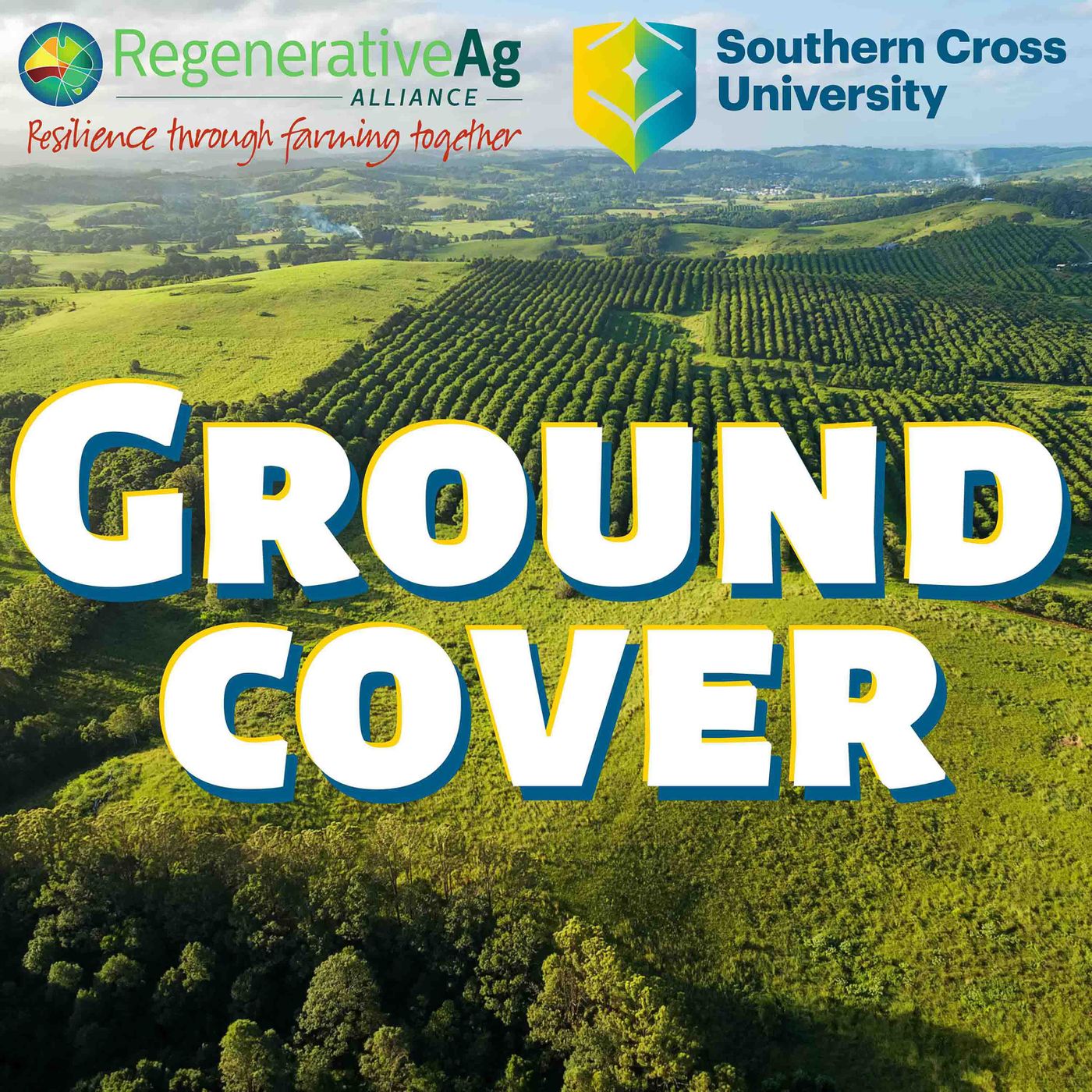
From little things big things grow with 6th generation farmer Michael Taylor
On Ground Cover today, Kerry is joined by Michael Taylor, a sixth generation wool producer from Kentucky, on the Northern Tablelands of NSW. Michael's family were one of the original settlers of the New England region. His parents, John and Vicky Taylor, discovered the real causes of the New England die back problem. The family tradition of experimentation and continuous learning is certainly instilled in Michael's approach to farming.Michael is our Agroforestry champion; diversifying his farm practices to create greater resilience for future generations. While also running a Merino sheep enterprise of the highest ethical standard.In this episode we hear about:the lessons the Taylors learned through experiencing major droughts over 3 generationsover clearing and over grazing and it's impact on die backhow Michael has diversified farm practices with timber and agroforestrythe importance of shelter in creating a functioning ecosystemthe impact of aesthetics on their propertyMore about Michael Taylor:Michael is the Managing Partner at Taylors Run mixed agricultural business, a family run Merino sheep and wool enterprise started in 1839. He has also taken on the further development of the agroforestry enterprise adding value for future generations. Both of these roles in the farm management include the responsibility of being a land custodian and steward in a competitive commercial environment. Continuous improvement of water use efficiency and regenerative farming practices provide a good education and demonstration site for other landholders.His involvement in the wool industry extends to two grower groups endeavouring to close the gap between producers and end users of Merino wool in apparel. Tablelands Merino is a regional group of only superfine Merino growers offering wool with guaranteed next-to-skin comfort. He is also a founding member and Director of Australian Ethical Merino Growers Co-operative.In his previous role as Director with Southern New England Landcare he contributed to an organisation that provides support to landholders in the region wishing to embark on better Natural Resource Management (NRM) projects. He is still involved as a peer mentor in the Agri-woodlands Group, helping landholders with their tree management projects.Michael studied Civil Engineering through RMIT, and worked with Hyder Consulting and Baulderstone-Hornibrook in Melbourne after completing his degree. Michael feels that Engineering has provided a strong base bringing another angle of professionalism into his current roles.Specialties include: civil engineering (roads and water), farm and small business management, wool and sheep classing, sheep breeding, cattle breeding, farm forestry management (siliviculture, harvesting and sawn timber processing), professional photography, medium scale graphic design and publishing.
Create Your Podcast In Minutes
- Full-featured podcast site
- Unlimited storage and bandwidth
- Comprehensive podcast stats
- Distribute to Apple Podcasts, Spotify, and more
- Make money with your podcast


